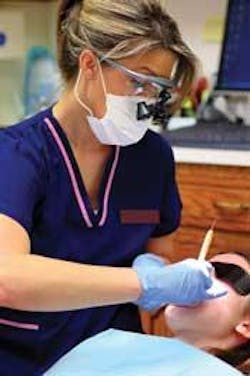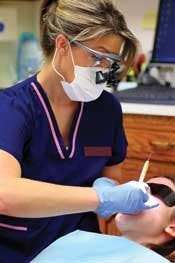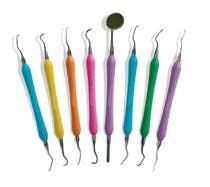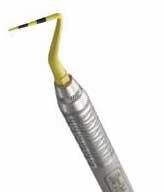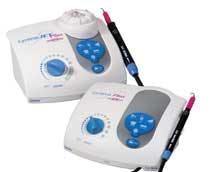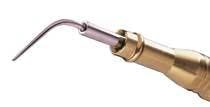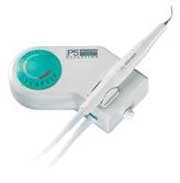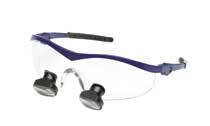What does your hygienist need to treat your patients?
You want your patients to receive the most excellent care possible in the hygiene department. In order to achieve that goal, your hygienist needs your assistance.
For more on this topic, go to www.dentaleconomics.com and search using the following key words: hygienist, dental hygiene department, equipment, Glasscoe Watterson.
Those needs may be summarized in four broad categories: appropriate equipment, sufficient time, continuing education, and encouragement.
Appropriate equipment
Hygienists cannot do their best work with substandard, broken, or an insufficient number of instruments. They need enough full sets for a full day of patients, so when certain instruments are sent out for retipping, there are still enough instruments available to use.
Hygienists also need several periodontal sets for root planing and scaling patients. Refrain from protesting when your hygienist requests instruments.
There are several good companies that manufacture dental instruments, but my favorites include those made by Dentsply and Hu-Friedy.
The Flexichange™ instruments by Dentsply allow the hygienist to change the instrument tip when it becomes necessary. The tips can be unscrewed from the handle with a special tool. This eliminates the need to send instruments out for retipping.
Hu-Friedy also makes high-quality dental instruments. Their Colorvue® probe is a favorite, as it allows the clinician to see the probe markings clearly.
This probe also allows the tip to be unscrewed from the handle and replaced when the markings become faded. Hu-Friedy also makes EverEdge® instruments with a stainless steel alloy for scalers and curettes that stay sharper longer. That means less frequent sharpening, less hand fatigue, and greater comfort and efficiency throughout the day.
A power scaler is an absolute necessity! Piezo or magnetostrictive, this equipment is vital for patient care. With the wide array of tip sizes available, hygienists can accomplish more than ever during the debridement process with a power scaler. Make sure your hygienist has a good power scaler with a sufficient supply of inserts or tips to do the job.
Favorite power scalers include the Dentsply Cavitron® Plus™ ultrasonic scaler and Cavitron® Jet Plus™, which combines air polishing and ultrasonic scaling in the same unit. Both models feature a convenient 360° wireless foot switch with "boost mode" for instantaneous extra power.
The ultrasonic insert that gives the most power for its small size is the Burnett Power Tip® by Parkell. This insert boasts 70 percent more power than conventional tips and can be safely used on maximum power. It is the "big gun" for heavy, tenacious calculus and is a "must have" item for the hygiene department.
A very good piezo unit is the Satelec® Suprasson P5 Booster manufactured by Acteon. This unit has some of the smallest tips available that allow the hygienist to scale to the depths of deep periodontal pockets.
Additionally, magnification will enable your hygienist to be more thorough in every aspect of care, from assessment to clinical procedures. Depending on your business relationship, you might opt to purchase loupes or pay a portion of the cost if your hygienist does not currently have magnification. The point is that magnification will enable the hygienist to do an overall better job for your patients. I recommend Designs for Vision 2.5X TTL for high-quality optics and overall comfort and dependability (www.designsforvision.com).
Appropriate time
Like doctors, hygienists vary in their work speed. Essentially, there are four work speeds associated with performance:
- fast and good
- fast and not good
- slow and good
- slow and not good
Every clinician eventually settles into a work pace that becomes the norm for that clinician. If the doctor is a high-energy, "rapid-fire" person, the hygienist needs to possess a similar work pace. Otherwise, they will be unhappy with each other. A methodical, highly focused doctor will appreciate a hygienist with similar work patterns.
Sometimes people equate slowness with being thorough and haste with substandard work. Sometimes those assumptions are true; sometimes they're not. The speed with which a person works should not be a gauge of work quality; however, when the hygienist is expected to perform numerous ancillary tasks in the dental hygiene visit, time becomes critical. Consider what the solo hygienist is expected to do in the typical dental practice for a hygiene visit:
- Set up operatory
- Update medical history
- Blood pressure screening
- Radiographs
- Intraoral/extraoral assessment
- Oral cancer screening
- Intraoral camera images
- Periodontal charting
- Scaling
- Polishing
- Homecare instructions
- Record appointment narrative
- Schedule patient's next visit
- Dismiss patient and operatory turnover
Even without specific time allotments for each of these tasks, it is difficult to see how all of them can be accomplished in less than one hour. I am not advocating the "one hour per patient" rule that so many offices espouse. I advocate that hygienists be proactive by planning ahead for successive visits. Hygienists should be given the flexibility to decide how much time will be needed for any given patient. For example, patients who smoke will generally take longer to complete than nonsmokers, but not always; partially edentulous patients usually take less time than people with full dentitions, but not always.
It is unrealistic to expect hygienists to take good care of your patients if insufficient time is allotted. It is a hygienist's worst nightmare to be in an office that expects patients to be seen in assembly-line fashion. Over-scheduling leads to high stress and high turnover. Attitudes of hopelessness and indifference sprout in hygienists who are over-scheduled, as high-quality preventive care is devalued.
Patients are not stupid! They will perceive low-quality care in your practice if they think they are rushed through a hygiene visit. Consider the possibility that at some future time, there will be no third-party dental benefits for patients. The hypothetical question is this: Will patients still come for their traditional twice-yearly preventive visits if they have to pay out of pocket? The answer to this question is: it depends. It depends on how much value they place on the preventive care they receive in your practice. Your hygienist needs to know that you value high-quality preventive care.
Continuing Education
Too many clinicians view continuing education as a necessity for license renewal only. Too many clinicians are content to keep on doing what they have always done, because change requires effort. Too many doctors attend continuing education courses without including their staff members.
Continuing education should be the fuel that keeps our professional fire burning! If you, as the practice leader, have a commitment to provide patients with the highest quality, most up-to-date care possible, you know the importance of being a continual learner. Your hygienist needs ample opportunity to participate in continuing education every year.
You should encourage participation in high-quality courses, rather than have your hygienist lag behind professionally. Consider continuing education an investment in the hygienist's ability to provide patients the best care possible.
The hygienist is in the best position to discuss treatment options with your patients. Many doctors want their hygienists to propose treatment options to patients; however, for your hygienist to be able to do that confidently, she or he needs to understand what you can do and how those treatment options can best serve your patients.
Encouragement, appreciation, and trust
More than anything else, your hygienist needs to know that you value his or her efforts in caring for your patients. A sincere word of encouragement shows that you support him or her, even in difficult patient situations. Trust sets your hygienist free to rise to his or her highest capability. Expressing your appreciation causes your hygienist and all staff members to esteem you to levels you cannot even imagine.
As a young hygienist, I worked with Dr. Hal Davis in Asheboro, N.C. (now retired). He would sometimes say to my patient, "Dianne did a great job on your teeth today!" Those good words would make me "glow" all day! His encouragement made me want to do my best, to give his patients 110 percent, to be worthy of his favor. At the end of a hard day at the office, he would sometimes say, "Thanks for your hard work. I'm the luckiest dentist alive to have such a great group of ladies." It is hard to put into words how much his appreciation meant. His words gave us affirmation that no matter how tired we were, it was worth it!
Doctors, you should be the chief cheerleader for your staff members. Some of you need to step up and accept that role as the practice leader. Remember — praise in public; criticize in private.
Final words
This article addressed a few of the basic things your hygienist needs to care for your patients. There are other things that would enhance your hygienist's ability, such as a headlight, ergonomic chair, computer training, etc. Scraping teeth all day is difficult, physically challenging work! Your hygienist needs the appropriate equipment, scheduling, and continuing education to do the job well. These things all have a monetary cost.
However, the most important thing that your hygienist needs does not have a monetary cost. It is your expression of sincere appreciation for the hygienist's contribution to your patients' well-being through excellent preventive care. That is food for thought!
Dianne Glasscoe Watterson assists dental practices in achieving their highest potential through practical, effective onsite consulting. Her continuing education courses help dental professionals refresh their knowledge base and reignite professional passion. Visit Watterson's Web site at www.professionaldentalmgmt.com or send her an e-mail at [email protected].
